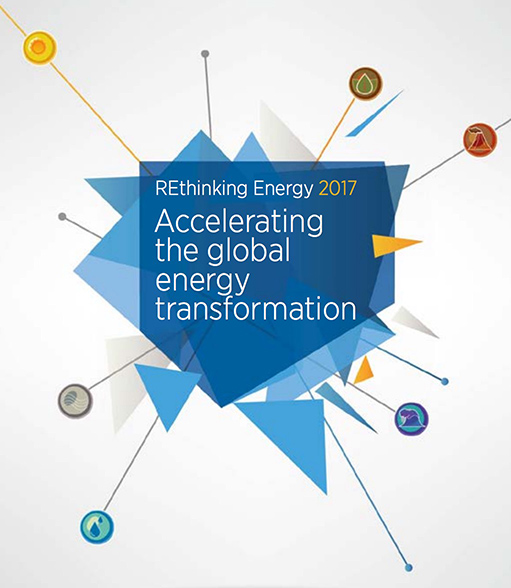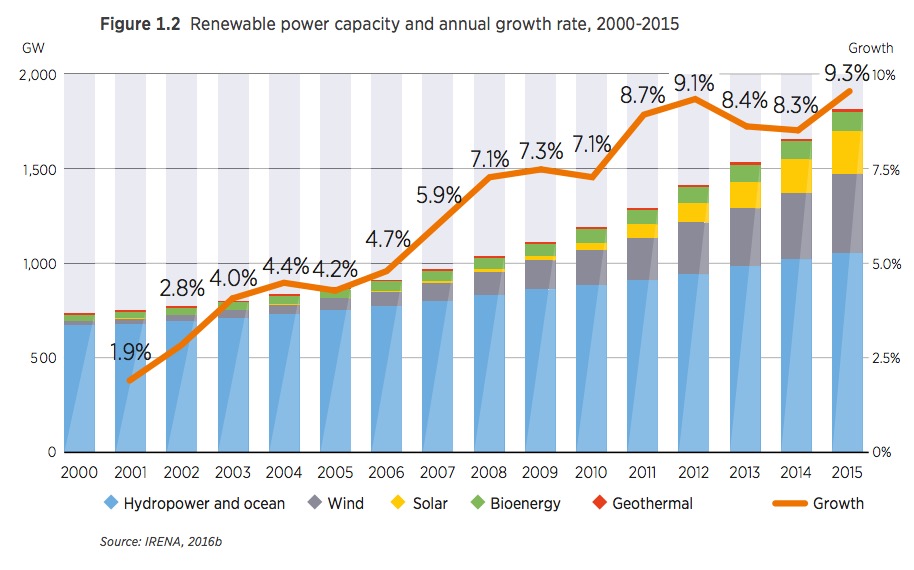INTERNATIONAL RENEWABLE ENERGY AGENCY (IRENA)
Executive Summary
 Renewable energy is a fundamental and growing part of the world’s ongoing energy transformation. Governments all over the world are joining that consensus. The use of renewables is their prime choice for enhancing access to affordable, reliable and cleaner sources of modern energy services. More than 170 countries have established renewable energy targets, and nearly 150 have enacted policies to catalyse investments in renewable energy technologies. Many are looking to partner with an increasingly active private sector.
Renewable energy is a fundamental and growing part of the world’s ongoing energy transformation. Governments all over the world are joining that consensus. The use of renewables is their prime choice for enhancing access to affordable, reliable and cleaner sources of modern energy services. More than 170 countries have established renewable energy targets, and nearly 150 have enacted policies to catalyse investments in renewable energy technologies. Many are looking to partner with an increasingly active private sector.
Recent studies by IRENA and its partners have shown clearly that renewables are competitive, attractive to investors and creating millions of new jobs. They present a compelling business case. This edition of REthinking Energy, the third in IRENA’s series, examines the dramatic changes under way in the energy sector in many countries. Among them is the growing maturity of the renewable energy market, coupled with technology advancements and policy refinement. Together, these developments provide an opportunity to develop an energy system that underpins sustainable development objectives. The foundations exist for accelerating the global energy transition, but efforts need to step up to achieve long-lasting change. Policy commitments still need to be strengthened, additional investments catalysed, and technological innovation fostered if new markets are to be geared up, efficiency enhanced and costs driven down even further.
According to nearly every measure, renewable energy is gaining ground. Today, one out of every five units of energy delivered to consumers comes from renewable sources. This is remarkably evident in the power sector, where renewables are growing at unprecedented rates, far outpacing growth in conventional technologies. Since 2012, new generating capacity fuelled by renewables has exceeded that fuelled by non-renewables by a widening margin. At 154 gigawatts (GW), capacity from renewables represented 61% of all new power generating capacity added worldwide in 2015 (IRENA, 2016b).
Renewables are now the first-choice option for expanding, upgrading and modernising power systems around the world. Wind and solar power, which commanded about 90% of 2015 investments in renewable power, are now competitive with conventional sources of electricity, as their costs have plunged in recent years. The cost of wind turbines has fallen by nearly a third since 2009 and that of solar photovoltaic (PV) modules by 80%. These developments are reflected in the levelised cost of electricity with some renewable technologies having reached grid parity. Currently, onshore wind, biomass, geothermal and hydropower are all competitive or cheaper than coal, oil and gas-fired power stations, even without financial support and despite relatively low oil prices.
Great potential remains for renewables. Currently, the share of renewable energy in total final energy consumption stands at 18.3%. About one-half of this portion is made up of modern renewables, evenly split between electricity and direct heat applications. The other half consists of traditional biomass used for heating and cooking. If all current national plans and policies are fully implemented without additional measures, the share of renewable energy in the total global final energy mix will rise only slightly by 2030 – from 18.3% to 21% – a measure of the extent of unexploited potential.
IRENA envisions a far more ambitious pursuit of all available renewable energy options and of energy efficiency, one that will result in a doubling to a 36% energy share for renewables by 2030. This doubling can be reached with available policy, investment and innovation interventions, while also achieving universal access to modern energy without unsustainable use of biomass. This ambitious goal will require accelerated deployment of modern renewables and energy efficiency measures.
Accelerating the deployment of renewable energy will fuel economic growth, create new employment opportunities, enhance human welfare and contribute to a climate-safe future. Renewables already are a significant source of new employment, accounting for an estimated 9.4 million jobs in 2015 (including large hydropower). Asia is the leading region, and solar PV and bioenergy are the leading technologies. Were the share of renewables to reach 36% by 2030, employment could amount to an estimated 24.4 million (IRENA, 2016c).
The socio-economic benefits go well beyond jobs. Doubling the share of renewables could raise global GDP in 2030 by more than a percentage point over the baseline projection, or United States dollar (USD) 1.3 trillion in 2015 dollars – equal to the current combined economies of Chile, South Africa and Switzerland (IRENA, 2016e). Doubling would also save up to USD 4.2 trillion annually in avoided expenditures related to climate change and air pollution. In addition, cumulative savings of energy-related CO2 emissions could reach 12 gigatonnes (IRENA, 2016d).
As the energy transformation quickens its pace, broader and deeper decarbonisation efforts are required. Beyond the power sector, more emphasis needs to be placed on the use of renewable energy for heating and cooling in buildings and industry and for transportation. The growing inclusion of renewables in all end-use sectors will rely on an enabling environment centred on the key dimensions of policy, finance and investment, technology and energy access. Each dimension is presented below.
Download full version (PDF): REthinking Energy 2017
About the International Renewable Energy Agency (IRENA)
www.irena.org
The International Renewable Energy Agency (IRENA) is an intergovernmental organisation that supports countries in their transition to a sustainable energy future, and serves as the principal platform for international cooperation, a centre of excellence, and a repository of policy, technology, resource and financial knowledge on renewable energy. IRENA promotes the widespread adoption and sustainable use of all forms of renewable energy, including bioenergy, geothermal, hydropower, ocean, solar and wind energy in the pursuit of sustainable development, energy access, energy security and low-carbon economic growth and prosperity.
Tags: International Renewable Energy Agency, IRENA, Renewable Energy, Renewables







 RSS Feed
RSS Feed